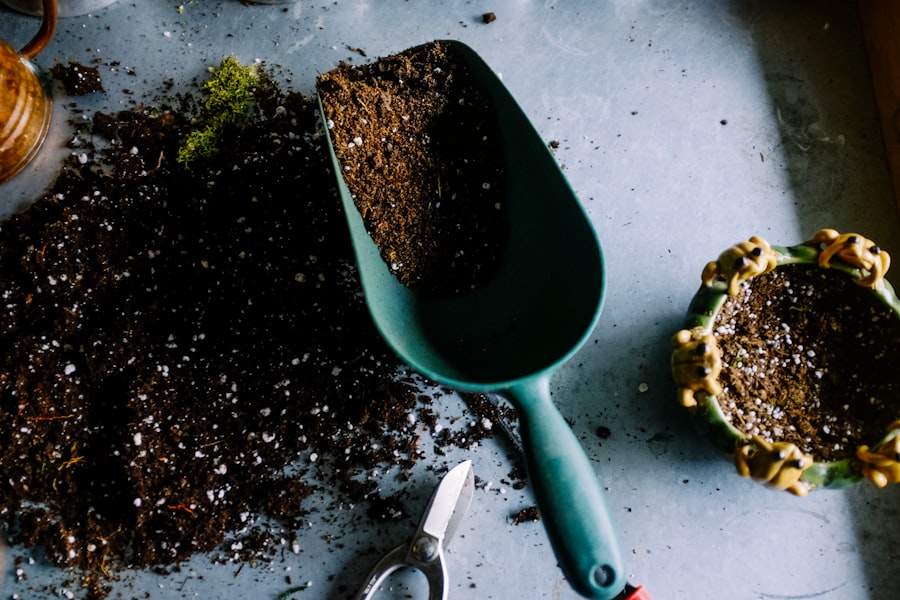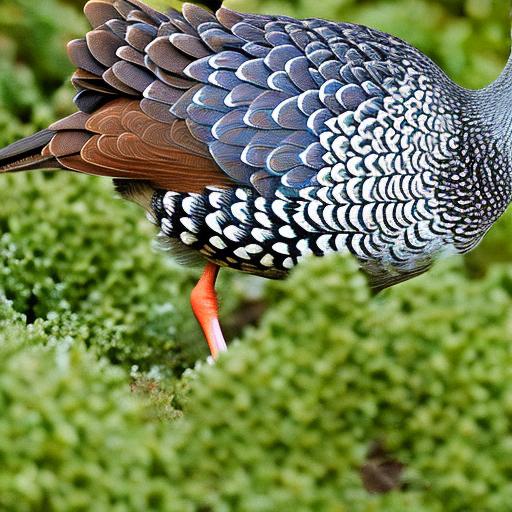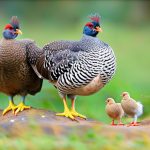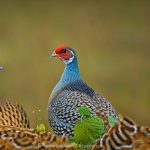Guinea fowl are social birds that are known for their loud calls and distinctive appearance. They are highly active during the day and spend most of their time foraging for food. Guinea fowl are also known to be very curious and will investigate anything new in their environment. They are also known to be quite territorial and will defend their space from perceived threats. Understanding these behaviors is crucial when it comes to deterring guinea fowl from unwanted areas.
Guinea fowl are also known to be quite vocal, especially when they feel threatened or alarmed. They have a loud, distinctive call that can be heard from a distance. This behavior can be both a blessing and a curse when it comes to deterring them. On one hand, their loud calls can alert you to their presence, making it easier to deter them. On the other hand, their vocal nature can also make them more difficult to deter, as they may not be easily frightened off by visual or sound deterrents. Understanding these behaviors can help you choose the most effective deterrent methods for your specific situation.
Key Takeaways
- Guinea fowl are social birds that prefer to roost in trees and will return to the same spot each night.
- Physical barriers such as fences and netting can be effective in keeping guinea fowl out of specific areas.
- Visual deterrents like scarecrows and reflective tape can startle guinea fowl and discourage them from entering certain areas.
- Sound deterrents such as loud noises or predator calls can help keep guinea fowl away from unwanted areas.
- Scents and taste deterrents like garlic or hot pepper spray can be used to make areas unappealing to guinea fowl.
Creating Physical Barriers
One of the most effective ways to deter guinea fowl from unwanted areas is to create physical barriers that prevent them from accessing those areas. This can include installing fences, netting, or other structures that make it difficult for guinea fowl to enter the area. Fences should be at least 4 feet high to prevent guinea fowl from flying over them, and the bottom of the fence should be buried or secured to the ground to prevent guinea fowl from digging underneath. Netting can also be effective, especially if it is installed at an angle to prevent guinea fowl from landing on it.
Another option for creating physical barriers is to use scare tape or other visual deterrents that create a physical barrier without actually blocking the area. Scare tape is a reflective material that can be strung across an area to create a visual barrier that guinea fowl will be reluctant to cross. This can be especially effective in open areas where installing a physical fence may not be practical. By understanding the behavior of guinea fowl and their tendency to avoid unfamiliar objects, you can create physical barriers that effectively deter them from unwanted areas.
Using Visual Deterrents
Visual deterrents can be an effective way to deter guinea fowl from unwanted areas. Guinea fowl are naturally wary of unfamiliar objects and will often avoid areas where they perceive a potential threat. By using visual deterrents such as scarecrows, predator decoys, or reflective objects, you can create an environment that is less inviting to guinea fowl.
Scarecrows are a classic visual deterrent that can be effective in deterring guinea fowl. By placing scarecrows in the area where guinea fowl are causing problems, you can create the impression of a human presence, which can make guinea fowl feel uneasy and less likely to enter the area. Predator decoys, such as fake owls or hawks, can also be effective in deterring guinea fowl. Guinea fowl are naturally wary of predators and will often avoid areas where they perceive a potential threat. By placing predator decoys in the area, you can create the impression of a predator presence, which can make guinea fowl feel uneasy and less likely to enter the area.
Reflective objects, such as CDs or aluminum foil strips, can also be effective in deterring guinea fowl. Guinea fowl are naturally wary of unfamiliar objects and will often avoid areas where they perceive a potential threat. By hanging reflective objects in the area, you can create a visual deterrent that makes guinea fowl feel uneasy and less likely to enter the area. By understanding the behavior of guinea fowl and their natural wariness of unfamiliar objects, you can use visual deterrents to effectively deter them from unwanted areas.
Implementing Sound Deterrents
Sound deterrents can be an effective way to deter guinea fowl from unwanted areas. Guinea fowl are naturally wary of loud or unexpected noises and will often avoid areas where they perceive a potential threat. By using sound deterrents such as ultrasonic devices, noise makers, or even recorded predator calls, you can create an environment that is less inviting to guinea fowl.
Ultrasonic devices emit high-frequency sounds that are unpleasant to guinea fowl but are inaudible to humans. By placing ultrasonic devices in the area where guinea fowl are causing problems, you can create a sound deterrent that makes the area less inviting to them. Noise makers, such as air horns or whistles, can also be effective in deterring guinea fowl. Guinea fowl are naturally wary of loud or unexpected noises and will often avoid areas where they perceive a potential threat. By using noise makers in the area, you can create a sound deterrent that makes guinea fowl feel uneasy and less likely to enter the area.
Recorded predator calls, such as those of hawks or owls, can also be effective in deterring guinea fowl. Guinea fowl are naturally wary of predators and will often avoid areas where they perceive a potential threat. By playing recorded predator calls in the area, you can create a sound deterrent that makes guinea fowl feel uneasy and less likely to enter the area. By understanding the behavior of guinea fowl and their natural wariness of loud or unexpected noises, you can use sound deterrents to effectively deter them from unwanted areas.
Utilizing Scents and Taste Deterrents
Scents and taste deterrents can be an effective way to deter guinea fowl from unwanted areas. Guinea fowl have a keen sense of smell and taste and will often avoid areas where they perceive unpleasant odors or tastes. By using scents such as citrus oils or garlic, or taste deterrents such as hot pepper spray, you can create an environment that is less inviting to guinea fowl.
Citrus oils, such as lemon or orange oil, can be effective in deterring guinea fowl. Guinea fowl are naturally wary of unfamiliar scents and will often avoid areas where they perceive a potential threat. By spraying citrus oils in the area where guinea fowl are causing problems, you can create a scent deterrent that makes the area less inviting to them. Garlic can also be effective in deterring guinea fowl. Guinea fowl are naturally wary of unfamiliar scents and will often avoid areas where they perceive a potential threat. By planting garlic in the area, you can create a scent deterrent that makes guinea fowl feel uneasy and less likely to enter the area.
Hot pepper spray can also be effective in deterring guinea fowl. Guinea fowl have a keen sense of taste and will often avoid areas where they perceive unpleasant tastes. By spraying hot pepper spray in the area where guinea fowl are causing problems, you can create a taste deterrent that makes the area less inviting to them. By understanding the behavior of guinea fowl and their natural wariness of unpleasant odors and tastes, you can use scents and taste deterrents to effectively deter them from unwanted areas.
Providing Alternative Feeding Areas

One way to deter guinea fowl from unwanted areas is to provide alternative feeding areas that are more appealing to them. Guinea fowl are highly active foragers and will often seek out areas with abundant food sources. By providing alternative feeding areas with grains, seeds, or other food sources that guinea fowl find appealing, you can redirect their attention away from the areas where they are causing problems.
Setting up feeding stations with grains or seeds in an area away from where guinea fowl are causing problems can help draw them away from those areas. By providing an alternative food source that is more appealing to them, you can encourage guinea fowl to spend more time in the designated feeding area and less time in the unwanted areas. This can help reduce their impact on your property while still allowing them access to food sources.
Another option is to plant cover crops or grassy areas specifically for guinea fowl to forage in. By creating designated foraging areas with abundant food sources, you can encourage guinea fowl to spend more time in those areas and less time in the unwanted areas. This can help reduce their impact on your property while still allowing them access to food sources. By understanding the behavior of guinea fowl and their natural inclination to seek out abundant food sources, you can provide alternative feeding areas that effectively deter them from unwanted areas.
Consistent Monitoring and Maintenance
Consistent monitoring and maintenance are crucial when it comes to deterring guinea fowl from unwanted areas. Guinea fowl are intelligent birds that may become accustomed to certain deterrent methods over time. It is important to regularly assess the effectiveness of your chosen deterrent methods and make adjustments as needed.
Regularly inspecting physical barriers for damage or wear and tear is important for ensuring their effectiveness in deterring guinea fowl. Repairing any damage promptly will help maintain the integrity of the barriers and prevent guinea fowl from finding ways to bypass them. Similarly, visual deterrents should be periodically moved or adjusted to prevent guinea fowl from becoming accustomed to their presence.
Sound deterrents should also be periodically evaluated for their effectiveness in deterring guinea fowl. It may be necessary to change the type of sound emitted or adjust the volume or frequency of the deterrent devices to prevent habituation by the birds. Additionally, scents and taste deterrents should be reapplied as needed to maintain their effectiveness.
Consistent monitoring of alternative feeding areas is also important for ensuring their effectiveness in drawing guinea fowl away from unwanted areas. Regularly replenishing food sources and maintaining these designated feeding areas will help ensure that guinea fowl continue to find them appealing.
In conclusion, understanding guinea fowl behavior is crucial when it comes to effectively deterring them from unwanted areas. By creating physical barriers, using visual deterrents, implementing sound deterrents, utilizing scents and taste deterrents, providing alternative feeding areas, and consistently monitoring and maintaining these methods, you can effectively deter guinea fowl from causing problems on your property while still allowing them access to food sources and suitable habitats.
If you’re struggling to keep guinea fowl out of your garden, you’re not alone. These curious birds can be quite a nuisance when it comes to foraging in your plants and flower beds. However, there are several effective strategies you can employ to deter them from wreaking havoc in your garden. For more tips on managing poultry and ensuring their well-being, check out this insightful article on what geese can eat and how to provide them with proper nutrition.
FAQs
What are guinea fowl?
Guinea fowl are a type of bird native to Africa. They are known for their distinctive spotted feathers and loud, chattering calls.
Why do guinea fowl pose a problem in gardens?
Guinea fowl are known to be voracious eaters and can cause damage to gardens by eating plants, vegetables, and fruits. Their scratching and pecking behavior can also disturb the soil and damage garden beds.
What are some methods to keep guinea fowl out of the garden?
Some methods to keep guinea fowl out of the garden include using physical barriers such as fences or netting, using scare tactics such as noise makers or visual deterrents, and providing alternative feeding areas to distract the guinea fowl from the garden.
Are there any natural deterrents for guinea fowl?
Some natural deterrents for guinea fowl include planting strong-smelling herbs or flowers, such as lavender or marigolds, which guinea fowl may find unappealing. Additionally, using predator decoys or allowing natural predators like dogs or cats to roam the area can help deter guinea fowl.
Are there any legal restrictions on deterring guinea fowl?
It is important to check local regulations and laws before using any deterrent methods for guinea fowl, as some methods may be restricted or prohibited in certain areas. It is always best to use humane and non-lethal methods to deter guinea fowl from gardens.
Meet Walter, the feathered-friend fanatic of Florida! Nestled in the sunshine state, Walter struts through life with his feathered companions, clucking his way to happiness. With a coop that’s fancier than a five-star hotel, he’s the Don Juan of the chicken world. When he’s not teaching his hens to do the cha-cha, you’ll find him in a heated debate with his prized rooster, Sir Clucks-a-Lot. Walter’s poultry passion is no yolk; he’s the sunny-side-up guy you never knew you needed in your flock of friends!







